人教新目标(Go for it)版八年级下Unit 2 I'll help to clean up the city parks. Section A 课件(37张)
文档属性
| 名称 | 人教新目标(Go for it)版八年级下Unit 2 I'll help to clean up the city parks. Section A 课件(37张) | 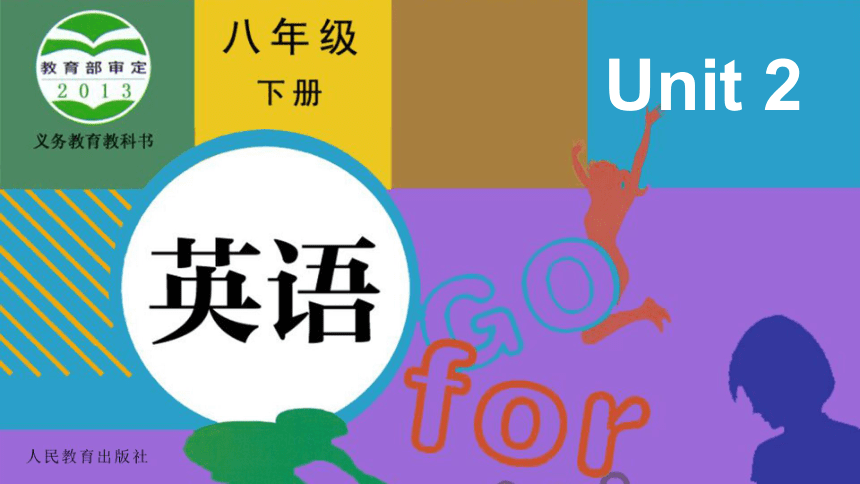 | |
| 格式 | pptx | ||
| 文件大小 | 29.6MB | ||
| 资源类型 | 教案 | ||
| 版本资源 | 人教新目标(Go for it)版 | ||
| 科目 | 英语 | ||
| 更新时间 | 2022-05-26 13:05:31 | ||
图片预览

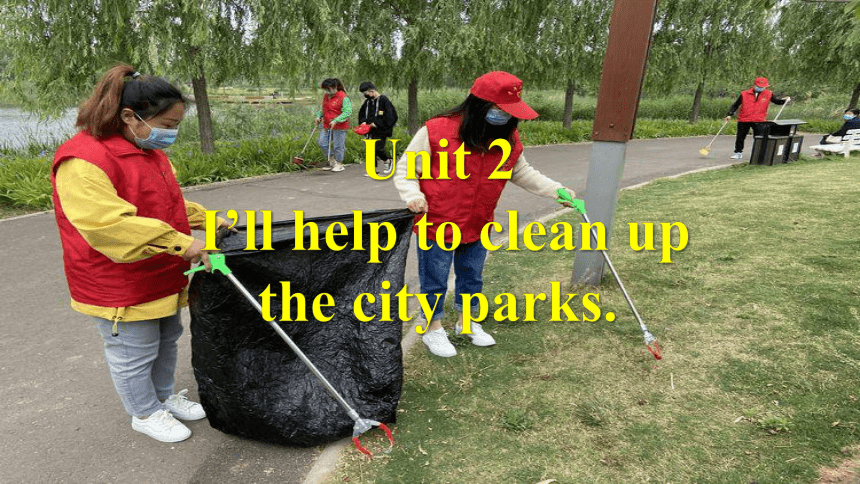
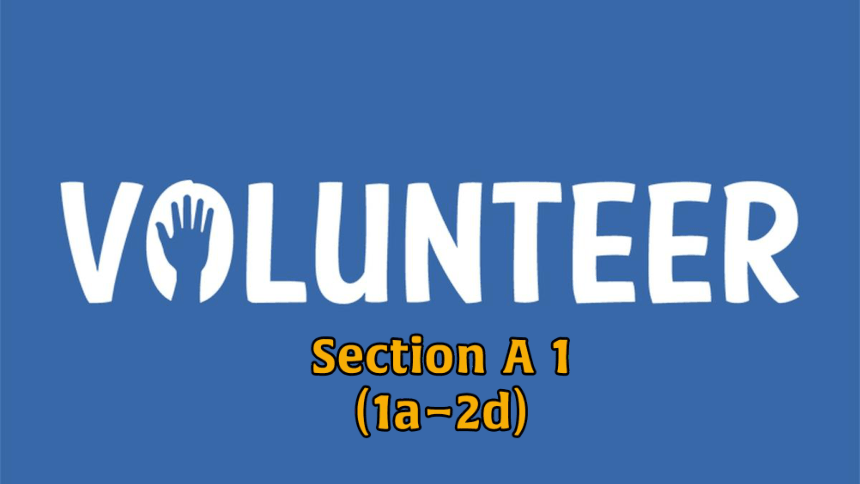
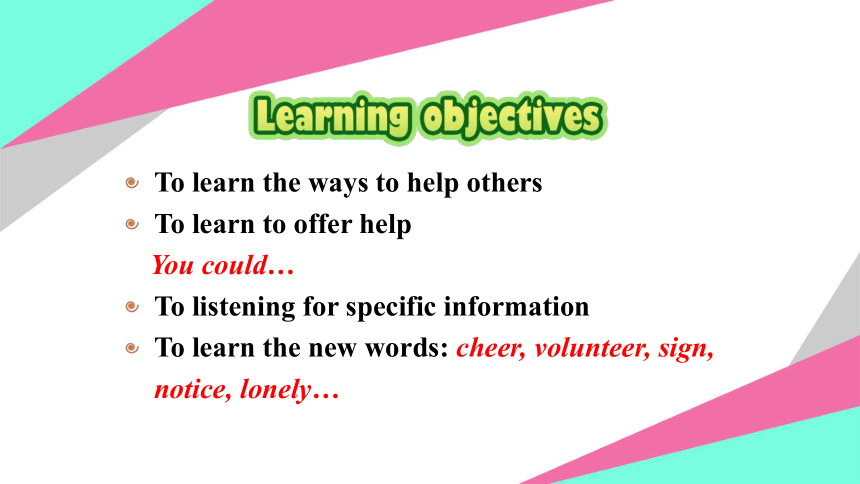
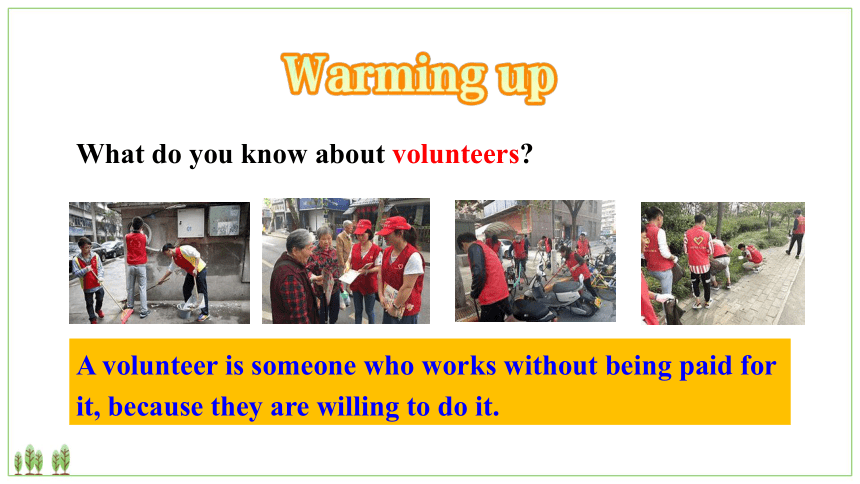
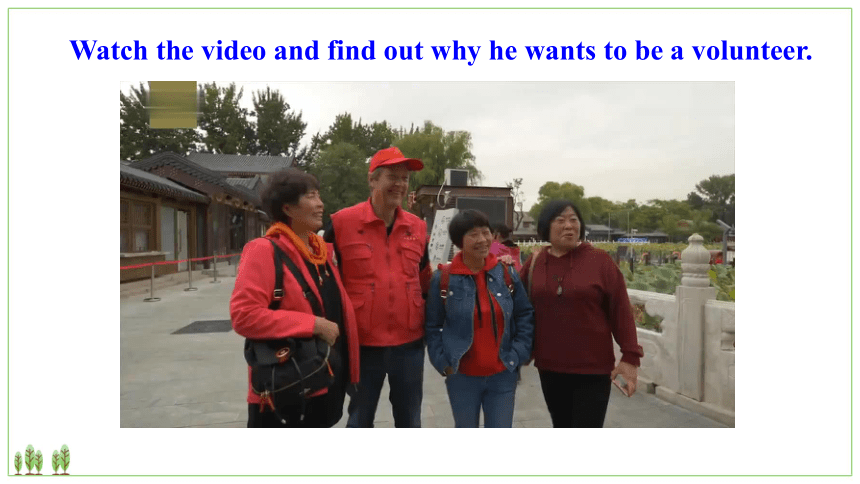
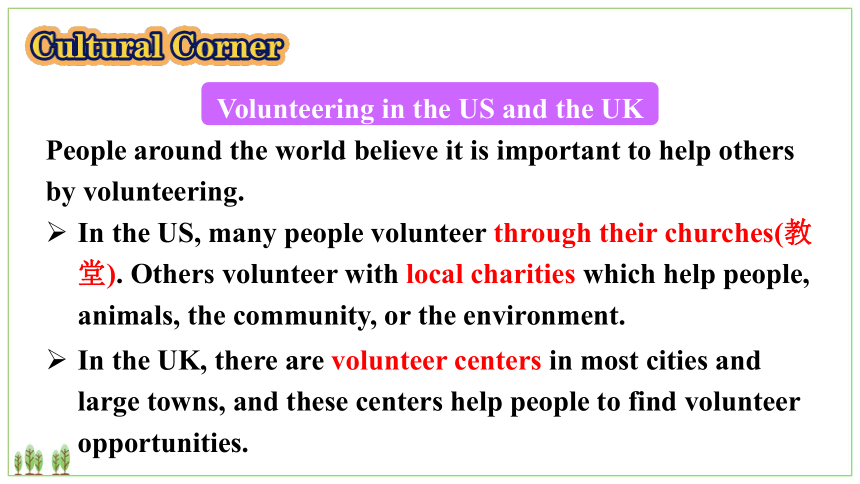

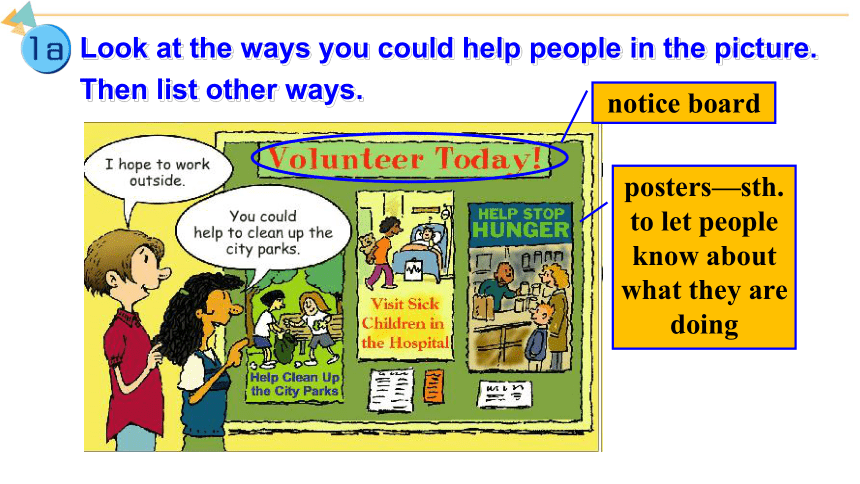
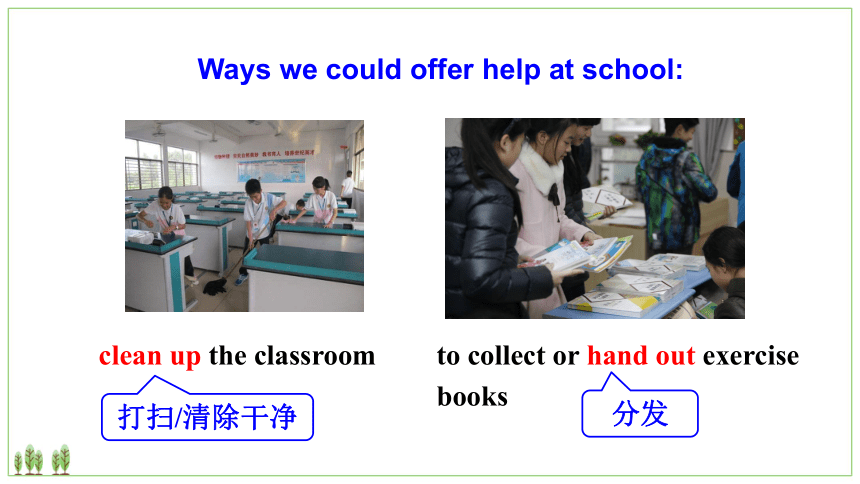
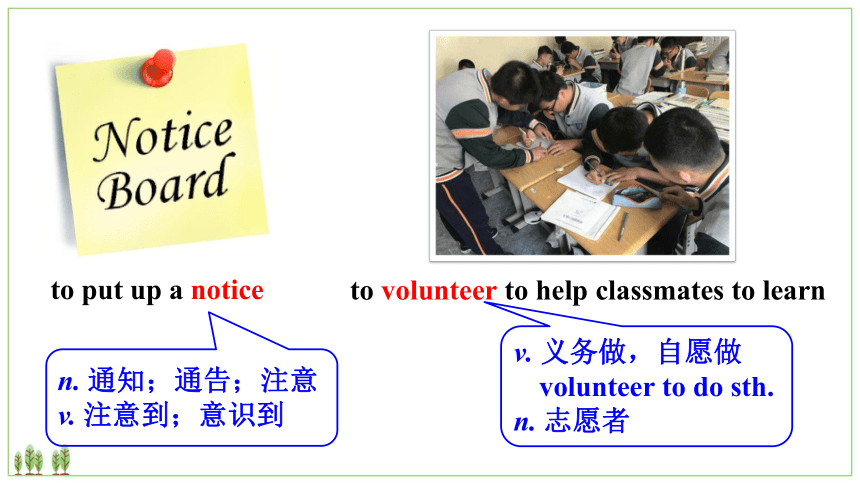
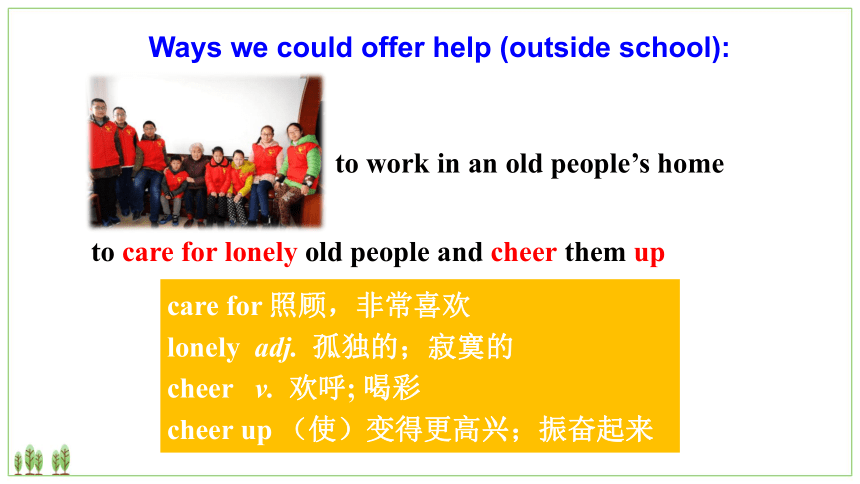
文档简介
(共37张PPT)
Unit 2
Unit 2
I’ll help to clean up
the city parks.
To learn the ways to help others
To learn to offer help
You could…
To listening for specific information
To learn the new words: cheer, volunteer, sign, notice, lonely…
What do you know about volunteers
A volunteer is someone who works without being paid for it, because they are willing to do it.
Watch the video and find out why he wants to be a volunteer.
Volunteering in the US and the UK
People around the world believe it is important to help others by volunteering.
In the US, many people volunteer through their churches(教堂). Others volunteer with local charities which help people, animals, the community, or the environment.
In the UK, there are volunteer centers in most cities and large towns, and these centers help people to find volunteer opportunities.
In both countries, some people choose to volunteer overseas, where they may share their skills or knowledge, or even teach English.
Look at the ways you could help people in the picture. Then list other ways.
notice board
posters—sth. to let people know about what they are doing
Ways we could offer help at school:
clean up the classroom
打扫/清除干净
to collect or hand out exercise books
分发
to put up a notice
v. 义务做,自愿做
volunteer to do sth.
n. 志愿者
to volunteer to help classmates to learn
n. 通知;通告;注意
v. 注意到;意识到
Ways we could offer help (outside school):
to care for lonely old people and cheer them up
care for 照顾,非常喜欢
lonely adj. 孤独的;寂寞的
cheer v. 欢呼; 喝彩
cheer up (使)变得更高兴;振奋起来
to work in an old people’s home
to help the old go across the road
to help to give out food
分发,散发
1. ______________________________________________
2. ______________________________________________
3. ______________________________________________
4. ______________________________________________
Other ways you could help people
coaching (训练) / teaching kids in a sport or hobby
donating clothes / toys / food to people who need them
helping disabled / elderly people with chores / shopping
teaching the elderly to use computers / e-mail, etc.
___ The girl could visit the sick kids in the hospital to cheer them up.
___ The boy could give out food at the food bank.
___ The girl could volunteer in an after-school study program to teach kids.
___ The boy could help to clean up the city parks.
Listen and number the ways the boy and girl could help others.
1
2
3
4
a place that gives food to poor people (向穷人分发食物的)食物库
I’d like/hope/want to…
You could…
work outside
help homeless people
cheer up sick kids
help kids with their schoolwork
give out food at the food bank to help feed them
volunteer in an after-school study program to teach kids
clean up the city parks
ask hospitals to let you visit the kids
Listen again and match the intentions with the suggestions.
How to express hope:
I hope to…
I’d like to…=I would like to…
I want to…
情态动词could后接动词原形,表达如何为他人提供帮助,含有建议的语气。
How to offer help:
You could…
Practice the conversation in the picture above. Then make other conversations using the information in 1b.
You could …
I hope to ...
I’d like to ...
I want to …
What can we do on City Park Clean-up Day Read the phrases below. Then match them with the pictures.
put an ad on TV
put up some signs
call up friends
put an ad in the newspaper
hand out notices
A group of students are planning a City Park Clean-Up Day. Listen and check (√) the things they are going to do to tell people about it.
√
√
√
1. We need to _____ ____ ____ a plan to tell people about the city park clean-up.
2. Clean-Up Day is only two weeks from now. We can’t ____ ____ making a plan.
3. We could ____ ____ signs.
come up with
put off
put up
Listen again. Fill in the blanks.
4. Let’s make some notices, too. Then I’ll _____ them _____ after school.
5. We could each ____ ____ 10 students and ask them to come.
hand out
call up
想出;提出(主意、计划、回答等)
推迟
分发
打电话给(某人);征召
come up with, put off,
put up, hand out, call up
均表达一个独立完整的意思,相当于一个动词;语法上将其称作 “短语动词” (phrasal verbs)。
张贴
come up with
put off
put up
hand out
call up
to give people something, usually on the street
to think of some ideas
to telephone someone
to delay (推迟) something to a later time
to fix something to a wall or board
Match the meanings with the phrasal verbs.
Make a conversation using the information in 2a and 2b.
A: We need to come up with a plan for the City Park Clean-Up Day.
B: Let’s have lunch first.
A: No, we need to start now. Clean-Up Day is only
two weeks from now.
Have you ever worked in an old people’s home
What can we do at an old people’s home
* read the newspaper to the old people
* talk to/with them
* listen to them
* care for them
* help them clean their rooms
* teach them how to use smart phones
…
For example:
养老院
Watch the flash and answer the questions.
1. Where’s Helen going to work this summer
_______________________________________________
2. What did Tom do to help the old people
________________________________________________
3. What can old people tell us
________________________________________________
________________________________________________
She’s going to work in an old people’s home.
Reading the newspaper or just talking to the old people.
They can tell us stories about the past and how things used to be.
Listen to the conversation and fill in the blanks.
Helen: Hi, Tom. I’m ___________________________ in an old people’s home this summer.
Tom: Really I did that last summer!
Helen: Oh, what did they ______________________
Tom: Mm…things like reading the newspaper to the old people, or just _________________ them. They told me stories about the past and how things ________________.
making some plans to work
ask you to help out with
talking to
used to be
Helen: That sounds interesting.
Tom: Yeah, a lot of old people are ______________. We should listen to them and _______________.
Helen: You’re right. I mean, we’re all going to be old one day, too.
care for them
lonely
Now role-play the conversation.
Helen is making plans to work in an old people’s home this summer. Tom ____________there last summer. He ___________ the newspaper to the old people or just ___________ them. The old people told Tom __________ about the past and how things used to be. They are lonely. We should ___________ them and ___________ them, as we are all going to be old ____________, too.
Fill in the blanks according to the conversation.
read
talked to
listen to
care for
one day
stories
volunteered
打扫(或清除)干净
张贴
探望医院的生病儿童
(使)变得更高兴;振奋起来
分发食物
课外学习活动
提出一个计划
clean up
put up
visit sick children in the hospital
cheer up
give out food
after-school study program
come up with a plan
推迟制定一个计划
打电话给(某人);征召
(帮助……)分担工作;解决难题
给老人读报纸
曾经……;过去……
照顾;非常喜欢
put off making a plan
call up
help out
read the newspaper to the old people
used to
care for
Ⅰ. 从方框中选择恰当单词的正确形式填空,每词限用一次。
sign, notice, lonely, volunteer
Bob has no friends in this city. He feels very _______.
2. Joe and Leo used to work as __________ in an old people's
home.
lonely
volunteers
3. If you follow the road _______, you will find my house.
4. During the meeting, I _______ that Rachel kept looking at her watch.
noticed
sign(s)
Ⅱ. 根据语境,从方框中选择恰当的短语填空,有的需要变
换形式。
come up with, give out, clean up,
put off, call up, care for, cheer up
1. After dinner, Mandy washed the dishes and __________ the kitchen.
2. Judy is helping her teacher ______________ books in the classroom.
3. We ___________ our sports meeting because of the bad weather.
cleaned up
(to) give out
put off
come up with, give out, clean up,
put off, call up, care for, cheer up
4. I hope you can ______________ a better plan than that.
5. Yesterday I _______________ my cousin Mary, but she didn’t answer.
6. The boy _______________ at once when I promised to take him to Disneyland.
7. Uncle Dick is very good at _______________ sick animals.
come up with
called up
cheered up
caring for
Think about the following questions. Write down your understanding of them.
Why do old people need help
Do you think we have to care for the old Why or why not
Unit 2
Unit 2
I’ll help to clean up
the city parks.
To learn the ways to help others
To learn to offer help
You could…
To listening for specific information
To learn the new words: cheer, volunteer, sign, notice, lonely…
What do you know about volunteers
A volunteer is someone who works without being paid for it, because they are willing to do it.
Watch the video and find out why he wants to be a volunteer.
Volunteering in the US and the UK
People around the world believe it is important to help others by volunteering.
In the US, many people volunteer through their churches(教堂). Others volunteer with local charities which help people, animals, the community, or the environment.
In the UK, there are volunteer centers in most cities and large towns, and these centers help people to find volunteer opportunities.
In both countries, some people choose to volunteer overseas, where they may share their skills or knowledge, or even teach English.
Look at the ways you could help people in the picture. Then list other ways.
notice board
posters—sth. to let people know about what they are doing
Ways we could offer help at school:
clean up the classroom
打扫/清除干净
to collect or hand out exercise books
分发
to put up a notice
v. 义务做,自愿做
volunteer to do sth.
n. 志愿者
to volunteer to help classmates to learn
n. 通知;通告;注意
v. 注意到;意识到
Ways we could offer help (outside school):
to care for lonely old people and cheer them up
care for 照顾,非常喜欢
lonely adj. 孤独的;寂寞的
cheer v. 欢呼; 喝彩
cheer up (使)变得更高兴;振奋起来
to work in an old people’s home
to help the old go across the road
to help to give out food
分发,散发
1. ______________________________________________
2. ______________________________________________
3. ______________________________________________
4. ______________________________________________
Other ways you could help people
coaching (训练) / teaching kids in a sport or hobby
donating clothes / toys / food to people who need them
helping disabled / elderly people with chores / shopping
teaching the elderly to use computers / e-mail, etc.
___ The girl could visit the sick kids in the hospital to cheer them up.
___ The boy could give out food at the food bank.
___ The girl could volunteer in an after-school study program to teach kids.
___ The boy could help to clean up the city parks.
Listen and number the ways the boy and girl could help others.
1
2
3
4
a place that gives food to poor people (向穷人分发食物的)食物库
I’d like/hope/want to…
You could…
work outside
help homeless people
cheer up sick kids
help kids with their schoolwork
give out food at the food bank to help feed them
volunteer in an after-school study program to teach kids
clean up the city parks
ask hospitals to let you visit the kids
Listen again and match the intentions with the suggestions.
How to express hope:
I hope to…
I’d like to…=I would like to…
I want to…
情态动词could后接动词原形,表达如何为他人提供帮助,含有建议的语气。
How to offer help:
You could…
Practice the conversation in the picture above. Then make other conversations using the information in 1b.
You could …
I hope to ...
I’d like to ...
I want to …
What can we do on City Park Clean-up Day Read the phrases below. Then match them with the pictures.
put an ad on TV
put up some signs
call up friends
put an ad in the newspaper
hand out notices
A group of students are planning a City Park Clean-Up Day. Listen and check (√) the things they are going to do to tell people about it.
√
√
√
1. We need to _____ ____ ____ a plan to tell people about the city park clean-up.
2. Clean-Up Day is only two weeks from now. We can’t ____ ____ making a plan.
3. We could ____ ____ signs.
come up with
put off
put up
Listen again. Fill in the blanks.
4. Let’s make some notices, too. Then I’ll _____ them _____ after school.
5. We could each ____ ____ 10 students and ask them to come.
hand out
call up
想出;提出(主意、计划、回答等)
推迟
分发
打电话给(某人);征召
come up with, put off,
put up, hand out, call up
均表达一个独立完整的意思,相当于一个动词;语法上将其称作 “短语动词” (phrasal verbs)。
张贴
come up with
put off
put up
hand out
call up
to give people something, usually on the street
to think of some ideas
to telephone someone
to delay (推迟) something to a later time
to fix something to a wall or board
Match the meanings with the phrasal verbs.
Make a conversation using the information in 2a and 2b.
A: We need to come up with a plan for the City Park Clean-Up Day.
B: Let’s have lunch first.
A: No, we need to start now. Clean-Up Day is only
two weeks from now.
Have you ever worked in an old people’s home
What can we do at an old people’s home
* read the newspaper to the old people
* talk to/with them
* listen to them
* care for them
* help them clean their rooms
* teach them how to use smart phones
…
For example:
养老院
Watch the flash and answer the questions.
1. Where’s Helen going to work this summer
_______________________________________________
2. What did Tom do to help the old people
________________________________________________
3. What can old people tell us
________________________________________________
________________________________________________
She’s going to work in an old people’s home.
Reading the newspaper or just talking to the old people.
They can tell us stories about the past and how things used to be.
Listen to the conversation and fill in the blanks.
Helen: Hi, Tom. I’m ___________________________ in an old people’s home this summer.
Tom: Really I did that last summer!
Helen: Oh, what did they ______________________
Tom: Mm…things like reading the newspaper to the old people, or just _________________ them. They told me stories about the past and how things ________________.
making some plans to work
ask you to help out with
talking to
used to be
Helen: That sounds interesting.
Tom: Yeah, a lot of old people are ______________. We should listen to them and _______________.
Helen: You’re right. I mean, we’re all going to be old one day, too.
care for them
lonely
Now role-play the conversation.
Helen is making plans to work in an old people’s home this summer. Tom ____________there last summer. He ___________ the newspaper to the old people or just ___________ them. The old people told Tom __________ about the past and how things used to be. They are lonely. We should ___________ them and ___________ them, as we are all going to be old ____________, too.
Fill in the blanks according to the conversation.
read
talked to
listen to
care for
one day
stories
volunteered
打扫(或清除)干净
张贴
探望医院的生病儿童
(使)变得更高兴;振奋起来
分发食物
课外学习活动
提出一个计划
clean up
put up
visit sick children in the hospital
cheer up
give out food
after-school study program
come up with a plan
推迟制定一个计划
打电话给(某人);征召
(帮助……)分担工作;解决难题
给老人读报纸
曾经……;过去……
照顾;非常喜欢
put off making a plan
call up
help out
read the newspaper to the old people
used to
care for
Ⅰ. 从方框中选择恰当单词的正确形式填空,每词限用一次。
sign, notice, lonely, volunteer
Bob has no friends in this city. He feels very _______.
2. Joe and Leo used to work as __________ in an old people's
home.
lonely
volunteers
3. If you follow the road _______, you will find my house.
4. During the meeting, I _______ that Rachel kept looking at her watch.
noticed
sign(s)
Ⅱ. 根据语境,从方框中选择恰当的短语填空,有的需要变
换形式。
come up with, give out, clean up,
put off, call up, care for, cheer up
1. After dinner, Mandy washed the dishes and __________ the kitchen.
2. Judy is helping her teacher ______________ books in the classroom.
3. We ___________ our sports meeting because of the bad weather.
cleaned up
(to) give out
put off
come up with, give out, clean up,
put off, call up, care for, cheer up
4. I hope you can ______________ a better plan than that.
5. Yesterday I _______________ my cousin Mary, but she didn’t answer.
6. The boy _______________ at once when I promised to take him to Disneyland.
7. Uncle Dick is very good at _______________ sick animals.
come up with
called up
cheered up
caring for
Think about the following questions. Write down your understanding of them.
Why do old people need help
Do you think we have to care for the old Why or why not
同课章节目录
- Unit 1 What's the matter?
- Section A
- Section B
- Unit 2 I'll help to clean up the city parks.
- Section A
- Section B
- Unit 3 Could you please clean your room?
- Section A
- Section B
- Unit 4 Why don't you talk to your parents?
- Section A
- Section B
- Unit 5 What were you doing when the rainstorm came
- Section A
- Section B
- Review of Units 1-5
- Unit 6 An old man tried to move the mountains.
- Section A
- Section B
- Unit 7 What's the highest mountain in the world?
- Section A
- Section B
- Unit 8 Have you read Treasure Island yet?
- Section A
- Section B
- Unit 9 Have you ever been to a museum?
- Section A
- Section B
- Unit 10 I've had this bike for three years.
- Section A
- Section B
